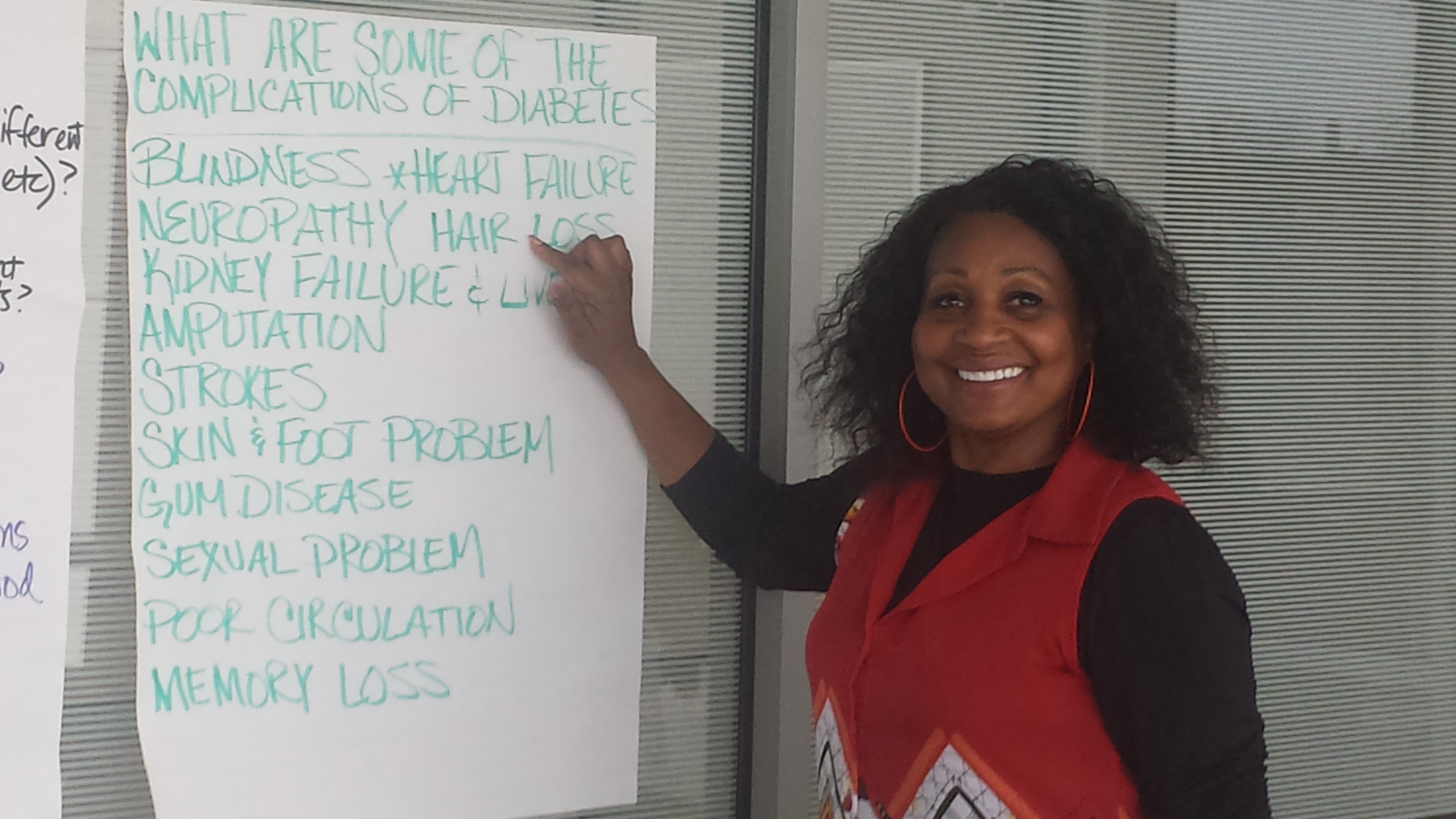Innovative program helps state residents living with diabetes

Beverly Bell learned to control her diabetes by taking a Healthy Living with Diabetes workshop. Now she’s trained to be a leader of the workshops.
MADISON — When she was diagnosed with diabetes, Beverly Bell wanted to handle it properly, because her father had died of complications from the disease years earlier.
So in January, the Milwaukee woman jumped at the chance to take a Living with Diabetes class, which is offered throughout the state by the Wisconsin Institute for Healthy Aging with support from the UW-Madison Health Innovation Program.
She made friends with other students at the class, and together they learned how to eat healthful foods and exercise regularly — she now works out at Planet Fitness each day. They also got advice on recognizing symptoms of rising blood sugar, and useful tips, such as how chewing on cinnamon can help lower blood sugar.
Since then, she’s lost 21 pounds, and her blood sugar level has dropped. “The doctors at the VA were just floored,” said Bell, 58, who owns a group home for mentally and physically challenged adults.
The Healthy Living with Diabetes program has taken off, both in popularity and effectiveness, since its launch in 2013. By the end of this year, there will have been more than 280 Healthy Living with Diabetes workshops held with more than 2,300 participants throughout the state, from Ashland in the north to La Crosse in the west to Racine in the southeast. That includes 15 workshops held in Spanish.
The key to the program’s success is that many of the trainers are people with diabetes who are recruited right from the communities they serve, so that they have credibility with those they’re trying to help, says Maureen Smith, director of the Health Innovation Program.

Maureen Smith
In fact, after finishing her class, Bell signed up to be a class leader for the program, and she’s taken the training. “I was like, you know what? I would like to spread the word on this,” she says.
The programs are held in the communities they serve, in locations such as churches, libraries and senior centers.
“Telling someone to do something is very different from helping them build the skills to carry it out,” Smith says. “This program is helping people get the skills and resources to manage diabetes.”
More than 230 trainers have completed the four-day training to facilitate the workshops, using a Stanford University-developed curriculum. The workshop series, taught to groups of 12 to 16, consists of 2.5-hour sessions held once a week over six weeks.
The program addresses a serious problem. Roughly 10 percent of Wisconsin adults live with diabetes, and that number is increasing. Older people and communities of color have even higher rates.
Diabetes can lead to severe and costly medical complications, such as amputations, cardiovascular disease, end-stage renal disease, blindness, and other problems that dramatically affect quality of life and longevity. Each year in Wisconsin, diabetes and its complications account for $6.15 billion in direct and indirect costs, according to the Wisconsin Department of Health Services.
“This program is helping people get the skills and resources to manage diabetes.”
Maureen Smith
Does the program work? It has been shown to be effective in national assessments, with a 53 percent reduction in emergency department visits; improvements in self-rated health and communication with physicians; and reductions in health distress and symptoms of hypo- and hyperglycemia.
The Health Innovation Program is currently working with the Wisconsin Institute for Healthy Aging to use participant workshop data to assess and improve the program.
The goal is to enhance patients’ self-efficacy using skill building, goal setting and reinforcement. It is highly interactive, emphasizing action planning and problem solving.
The program does not replace a patient’s existing treatments; instead, it complements his or her current medical treatment plan.
Topics discussed include, among others:
- Monitoring blood sugars and preventing high and low blood sugars
- Healthy eating and nutrition, food label reading and meal planning
- Relaxation techniques and stress management
- Short-term goal setting and planning for the future
- Communicating effectively with friends, family and the medical team
- Fitness for exercise and fun
- Preventing and delaying complications
The Wisconsin Partnership Program has provided funding to support the program.
People can sign up online at the Wisconsin Institute for Healthy Aging website to take or host a workshop.



